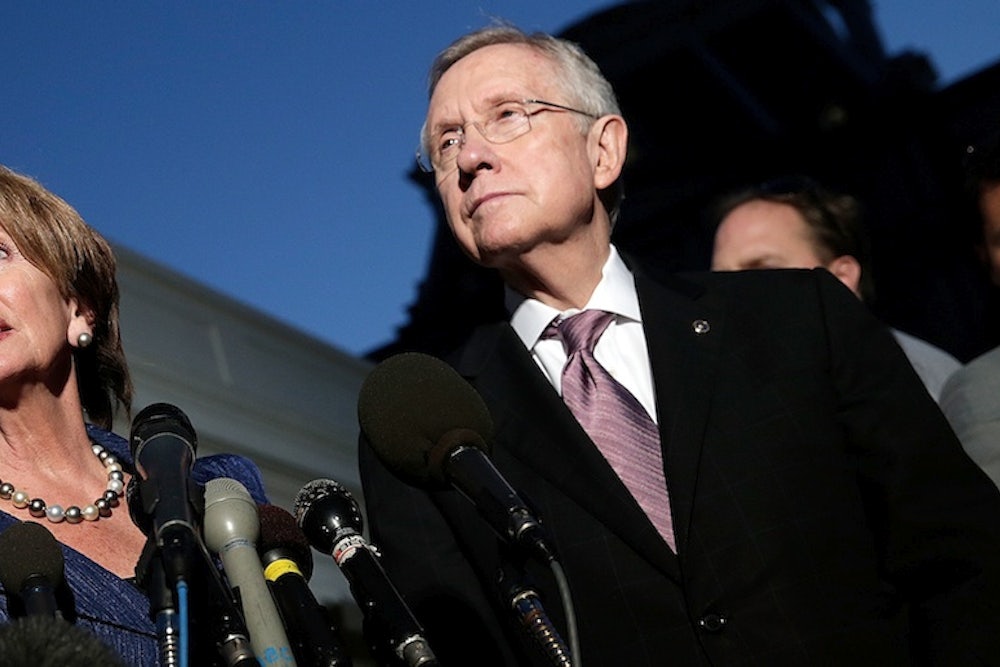It’s over. The Senate voted yes. The House voted yes. President Obama signed the bill and, on Thursday, the federal government is open for business again.
White House Press Secretary Jay Carney was careful not to gloat: “There are no winners here.” And he was right. Macroeconomic Advisers thinks the shutdown will end up costing the country $12 billion, while Standard and Poor’s is projecting a loss twice as large. That's a lot of damage to the economy and it will inevitably translate to a lot of unnecessary hardship for everyday Americans.
But in a narrower political sense, this was one of those (relatively) rare Washington battles in which one side clearly prevailed. It was the Democrats. When this episode started, they said they were determined not to make major concessions simply because Republicans were threatening shutdown and default. Sure enough, here we are—with a new continuing resolution, a higher debt limit, and no major changes in law. Democrats achieved the policy outcome they had sought, while establishing a precedent for the future: No more negotiating while under such threats.
Lots of people doubted it would turn out this way. Obama, after all, had negotiated with Republicans over the debt ceiling once before. Democrats in Congress don’t have a great reputation for party unity. But Obama held his ground—in public and in private. On Capitol Hill, Democrats from both chambers and both wings of the party said the same things and, behind the scenes, coordinated their actions.
Perhaps no episode better illustrated party determination and unity than the reaction, late last week, to a proposal from Republican Senator Susan Collins. The proposal was arguably more generous to the Democrats than what House Republicans had offered. But it still demanded Democrats give up something—in particular, lower domestic spending for the first half of next year. Particularly because it came from Collins, a moderate from Maine, it was the kind of proposal that seemed likely to attract interest from more conservative Democrats and perhaps the president as well. But at the White House and in Senate leadership offices, the word went out: Don’t take the deal. And it died.
So what did Democrats do right? How did they hold it together? Among the many factors, three come quickly to mind:
1. The troublemakers are gone. The Democratic caucuses were far more unruly in 2009 and 2010, when efforts to pass a stimulus, health care reform, financial regulation and climate change legislation produced squawking and dissent from conservative Democrats. But when the House Democrats lost their majority in the 2010 midterm, it was because they lost a bunch of more conservative members in marginal districts. As their ranks shrunk, they became more unified. Meanwhile, the Senate Democratic caucus has bid farewell to Blanche Lincoln, Kent Conrad, Ben Nelson, and Joe Lieberman—all more conservative and all (but particularly Lieberman) inclined to make trouble for party leadership. The ideology of the Democratic caucus shifted, but so did the temperament. “With their departure, and with the addition of Elizabeth Warren and some others, the caucus got a lot more progressive,” says Jim Manley, former spokesman for Ted Kennedy and then Harry Reid. “Both Nelson and Lieberman were the kind of senators who were always demanding to cut deals with Republicans.”
2. Republican crazy brings people together. The Senate still has some conservative Democrats, of course—Joe Manchin of West Virginia comes quickly to mind. But the agenda has changed a lot since 2009 and 2010: Instead of trying to enact their own policies, in this episode, at least, Democrats were mostly trying to stop Republicans from passing theirs. And that wasn’t so hard, given the nature of Republican tactics. Polls showed repeatedly that, despite the public ambivalence about Obamacare, majorities did not support shutting down the government in order to undermine the law. And as the shutdown wore on, it became clear that Republicans, not Democrats, were taking the blame. It helped, too, that prominent Senate Republicans were openly critical of what Ted Cruz and his House Republican allies were trying to do. With the lkes of Bob Corker, Lindsey Graham, and John McCain all speaking out against the shutdown and threats on the debt ceiling, conservative Democrats had plenty of political cover for sticking with their party.
3. The Democratic leaders were tough. Lots of Republicans had their doubts about the shutdown-debt ceiling strategy. But many went along because they figured Obama would give in. He didn’t—and it’s not surprising why. He saw Republican tactics as an existential threat, not just to his own presidency but to the presidency as an institution. As Jonathan Chait had started pointing out months ago, Obama couldn’t give in. Pelosi, as usual, held her caucus together—even though it meant telling them, at times, to take tough votes or settle for less than they wanted. (As she pointed out on more than a few occasions, with obvious reference to Boehner, that’s what leaders do.) And then there’s Reid, whose ability to keep the caucus together—and to take a hard, no-negotiation line against Republican tactics—made him a hero not just among his own colleagues but among his House counterparts and outside groups as well. “This victory for common sense is a testament to his profound tenacity, the trust his colleagues have in him and his ability to lead,” says Neera Tanden, president of the Center for American Progress. “And it is clear it would not have happened without him.”
